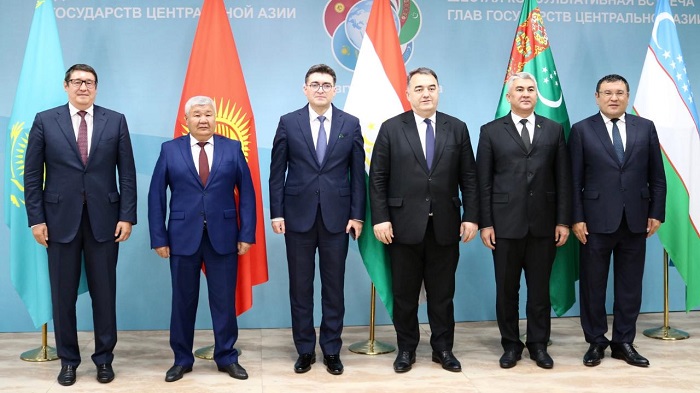On Tuesday, 6 August 2024, Astana hosted the first meeting of the energy ministers of the Central Asian states. The event was chaired by the Minister of Energy of Kazakhstan Almasadam Satkaliev.
The meeting was attended by:
• Kyrgyzstan – Minister of Energy Taalaibek Ibraev
• Tajikistan – Minister of Energy and Water Resources of Tajikistan Juma Daler Shofakir
• Uzbekistan – Minister of Energy Zhurabek Mirzamakhmudov
• Turkmenistan – Ambassador of Turkmenistan to Kazakhstan Batyr Rejepov
• Azerbaijan – Deputy Energy Minister of Azerbaijan Orkhan Zeynalov
Opening the meeting, the minister of energy of Kazakhstan noted the enormous potential in the development of energy cooperation and in strengthening existing ties between the countries of Central Asia.
According to him, today, among the challenges faced by the Central Asian countries are the global disruption of the stability of energy supplies, fluctuations in oil and gas prices and other factors.
“In order to ensure the reliability of energy supplies, it is necessary to develop mechanisms for forecasting and managing these challenges, as well as strengthen cooperation between our countries,” Satkaliyev said.
He also called on his colleagues to step up work on expanding opportunities for energy trade, as well as to establish the development of a low-carbon direction, achieving carbon neutrality and a phased energy transition.
“In addition, an important factor in the development of regional cooperation is the comprehensive attraction of investments and the implementation of large joint technological projects in the energy sector, aimed at stimulating the development of modern energy infrastructure in Central Asian countries,” the minister said.
According to Satkaliev, the possibility of implementing joint projects in the gas industry should also be explored.
He recalled that Kazakhstan is currently launching a global project in the field of development and transfer of green energy with Azerbaijan and Uzbekistan, and is actively discussing the construction of a large-scale Kambarata Hydro Power Plant -1 with Kyrgyzstan and Uzbekistan.
“In this regard, I propose to consider the possibility of implementing similar projects with the states of the region, in particular in the gas industry,” he suggested.
Following the meeting, the participants signed a communique, confirming their shaired commitment to strengthening cooperation and expand opportunities for energy trade, stimulating the development of modern energy infrastructure.
The parties support enhanced cooperation among Central Asian nations in energy development. This includes expanding partnerships in traditional energy sources like oil, gas, and petroleum products, as well as in renewable energy such as hydropower, solar, and wind power. They also pledge to advancing cooperation in nuclear energy for peaceful purposes and promoting green technology initiatives.
In addition, the parties expressed their readiness to establish an exchange of experience and cooperation in the field of digital transformation of the electric power industry.
The communique provides for the plans to work on the implementation of smart power grids and electricity storage systems, aimed at improving the quality of electricity management in the region.
The parties agreed to establish a permanent energy dialogue, create a working body and hold regular meetings of energy ministers.
Kazakhstan, Uzbekistan and Azerbaijan are moving forward with plans to export green energy to Europe
Azerbaijan, Kazakhstan, and Uzbekistan have agreed to establish a joint venture in Baku to facilitate the export of green energy from Central Asia to Europe. The announcement was made by Deputy Minister of Energy of Azerbaijan, Orkhan Zeynalov, at the first meeting of energy ministers from Central Asian states in Astana.
The three countries have also finalized the text of a strategic partnership agreement focused on developing and transferring green energy technologies.
“We are making significant progress in connecting the energy systems of Azerbaijan, Kazakhstan, and Uzbekistan to enable the export of green energy to Azerbaijan and subsequently to Europe,” said Zeynalov. “A joint working group has approved the terms of reference for a preliminary feasibility study, and we have reached a consensus on establishing a joint venture in Baku involving our national energy companies.”
Zeynalov highlighted Azerbaijan’s growing importance as a bridge between Central Asia and Europe for energy transportation. He emphasized that the development of alternative transport corridors is increasing the country’s role in diversifying energy supplies to global markets.
“Azerbaijan’s export corridors offer significant opportunities for Central Asian countries to transport green energy to Europe,” Zeynalov stated. “By accessing these routes, Central Asian nations can expand their export markets for electric power.”
Touching upon the issues of Azerbaijan’s energy cooperation with the countries of Central Asia, Zeynalov noted that it is developing fruitfully both bilaterally and multilaterally.
Uzbekistan and Azerbaijan continue to cooperate both in the field of oil and gas, as well as renewable energy sources. “A joint venture Turan Energy has been established for mutual trade in petroleum products, and the issue of mutual participation in oil and gas projects is also being considered,” Zeynalov said.
Since March last year, the transportation of oil from Kazakhstan through the Baku–Tbilisi–Ceyhan pipeline has resumed. ///nCa, 7 August 2024
